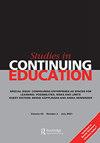Becoming an emotional worker and student: exploring skin and spa therapy education and training
IF 1.9
4区 教育学
Q2 EDUCATION & EDUCATIONAL RESEARCH
引用次数: 3
Abstract
ABSTRACT This study connects to the term ‘emotional labour’, coined by [Hochschild, A. R. (1983) 2003. The Managed Heart: Commercialization of Human Feeling. 2nd ed. Berkeley, CA: University of California Press], and explores how skin and spa therapy students are constructed as emotional workers in learning processes surrounding the body. Drawing on a poststructural approach, inspired by Foucault, regularities of description and self-description were analysed in the material, which consist of interviews and field notes derived from observations of classroom interaction. The results show how student subjectivities are produced as a response to the presumption about body availability in the educational arrangements. It also shows how students are positioned and position themselves as emotional workers through three reoccurring issues surrounding the body; the body as a private sphere, the body as a place of pain, and disgusting peculiarities of the body. Here, struggling subjectivities emerge, striving to overcome the obstacles that the body might entail in becoming a professional. The participants self-position and are positioned as responsible concerning each other’s’ learning processes, making their bodies available for their classmates to practice on, communicating their thoughts and feelings as posing clients, developing their empathic abilities towards future clients. Thus, the participants are not only produced as emotional workers, but emotional students, pinpointing the necessity of educational research on emotional labour.成为一名情感工作者和学生:探索皮肤和水疗治疗教育和培训
摘要本研究涉及“情绪劳动”一词,该词由[Hochschild,A.R.(1983)2003提出。被管理的心:人类情感的商业化。第2版,加利福尼亚州伯克利:加利福尼亚大学出版社],并探讨了皮肤和水疗治疗学生如何在身体周围的学习过程中被塑造成情绪工作者。在福柯的启发下,运用后结构方法,分析了材料中描述和自我描述的规律,包括访谈和课堂互动观察中的现场笔记。研究结果表明,在教育安排中,学生的主观能动性是如何作为对身体可用性假设的回应而产生的。它还展示了学生如何通过围绕身体的三个反复出现的问题来定位和定位自己作为情感工作者;身体是一个私人领域,身体是痛苦的地方,身体的恶心特性。在这里,挣扎的主观主义出现了,努力克服身体在成为专业人士时可能遇到的障碍。参与者自我定位,并被定位为对彼此的学习过程负责,让他们的身体可以供同学练习,以冒充客户的方式交流他们的想法和感受,培养他们对未来客户的同理心。因此,参与者不仅是情感工作者,而且是情感学生,这表明了对情感劳动进行教育研究的必要性。
本文章由计算机程序翻译,如有差异,请以英文原文为准。
求助全文
约1分钟内获得全文
求助全文
来源期刊

Studies in Continuing Education
EDUCATION & EDUCATIONAL RESEARCH-
CiteScore
4.70
自引率
6.70%
发文量
22
期刊介绍:
Studies in Continuing Education is a scholarly journal concerned with all aspects of continuing, professional and lifelong learning. It aims to be of special interest to those involved in: •continuing professional education •adults learning •staff development •training and development •human resource development
 求助内容:
求助内容: 应助结果提醒方式:
应助结果提醒方式:


